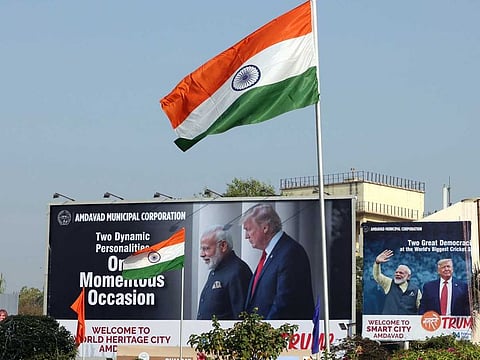Trump’s India visit will have echoes for the Middle East
India-US summit’s most direct impact on the region is likely to be on oil trade

American presidents are not frequent foreign travellers — and the incumbent is no exception.
In his first three years in office, Donald Trump has left the White House for an international trip 18 times — only five of them for single country visits.
Therefore, for him to take the Air force One on a spin, half-way around the globe, to spend 36 hours in India, is a conspicuous gesture.
Indian Prime Minister Narendra Modi’s two US visits have succeeded in forging a close rapport between the two leaders.
President Trump and First Lady Melania will breeze through Ahmadabad, the biggest city in Modi’s Gujarat state, see the “real” Taj Mahal in Agra (as compared to eponymous casino in Atlanta formerly owned by Trump Group) and land up in Delhi for a state visit on February 25.
Given the convention-defying persona of Donald Trump, perhaps the only thing predictable about his forthcoming visit to India is its unpredictability.Mahesh Sachdev, retired Indian diplomat
Trump’s visit validates some big highs in the Indo-US relations in recent years. The bilateral trade in goods and services was $142 billion in 2018 — with India enjoying $25 billion surplus. The US was India’s largest trading partner and India was eighth largest for the US. The US remains the largest investor in India with cumulative investments totalling up to $46 billion as FDI and $164 billion as FPI.
While Indian investments in the US are smaller, Indian IT companies alone employ around 100,000 Americans. Nearly four million persons of Indians extraction currently live in the US. They enjoy highest living standard as an identified ethnic group, and constitute an important voting bloc in the US politics.
The two countries have sought to leverage the visit to showcase their surging economic ties. While Indian purchases of the US crude, $2.6 billion worth of naval helicopters as well as an understanding to build nuclear power plants in India are on the cards, a limited trade deal may also be signed. The differences, lack of complementarities (particularly in farming sector), the US presidential elections and strong headwinds facing Indian economy have resulted in postponement of a comprehensive trade agreement for now.
A number of contemporary geopolitical developments are expected to frame the Modi-Trump Summit. India frets that a US troop withdrawal from Afghanistan may recreate safe havens for Al Qaida type militant outfits. The US policy of “maximum pressure” on Iran has seriously affected India which abhors turbulence in the neighbouring Gulf region. Lately, the Trump administration has also been ramping up political rhetoric against China, with which India’s own relations have occasionally been prickly. India would also be keen to supplant Covid-19 afflicted China as an alternative base for low cost manufacturing for the American multinationals.
Remittances from Gulf states
Trump’s India visit may have significant implications for the Middle East which has substantive ties with both countries. Ironically, as the US seeks to manage a drawdown of her profile in the region, Indians are under countervailing logic. India gets nearly 2.68 mbpd of her oil requirements from the Gulf region worth nearly $60 billion. Nearly eight million Indians live in the Gulf and are important source of remittances. Bilateral trade and investments exchanges are already significant and are likely to grow even bigger as Saudi Arabia implements the Vision 2030, while Iraq, Syria and Yemen reconstruct their war-ravaged societies and Iranian economy eventually reconnects. This backdrop permits some preliminary comments on the Modi-Trump summit’s likely impact on the region.
Greater Indo-US convergence on Middle East can facilitate their collaboration to secure and stabilise this geostrategic region. India has been vigorously pursuing her “Act West” engagement policy and has enhanced her naval presence in the Gulf waters. While India has acted alone so far, the Indo-US summit can create higher comfort level in this regard.
More intensified Indo-US P2P engagement can mean significant new business for Gulf-based carriers such as Emirates and Etihad, which heavily depend on air traffic between India and the US.
The surging US supplies are at expense of the Gulf whose share in India’s largely stagnant oil market fell by 5 per cent to below 60 per cent in 2019 — a four-year low.Mahesh Sachdev, former Indian diplomat
However, Indo-US summit’s most direct impact on the region is likely to be in an unexpected domain: the oil trade. India, world’s fifth largest economy and third largest crude importer, has traditionally been sourcing nearly two third of her requirements from the Gulf, main from Saudi Arabia, Iraq, the UAE, Iran and Kuwait. However, to mitigate her trade surplus with the US, India has recently started importing the US shale crude. These supplies which began only in 2017 grew by 63 per cent in 2019 to reach 181,000 bpd, meeting 4 per cent of Indian imports.
The US shale oil exporters have began offering competitive terms to lure the Indian buyers. After a deal at the summit, these supplies may double next year to around a tenth of India’s global imports. The surging US supplies are at expense of the Gulf whose share in India’s largely stagnant oil market fell by 5 per cent to below 60 per cent in 2019 — a four-year low. If persisted, this could upend the long establish trade pattern between the Gulf and neighbouring India.
But then, given the convention-defying persona of Donald Trump, perhaps the only thing predictable about his forthcoming visit to India is its unpredictability.
— Mahesh Sachdev is a retired Indian diplomat and an Arabist. He currently chairs Eco-Diplomacy & Strategies, New Delhi.


